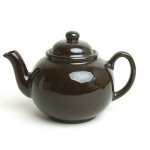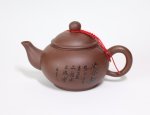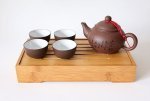Tulsi Tea
–
The Elixir of Life
Tulsi tea, also called holy basil tea, is known in the therapy field of Indian ayurvedic as the "elixir of life" or "queen of herbs". It is a very important plant in the therapy world of Ayurveda, or the science of life.
What is Tulsi?
Tulsi herbal tea is made from the leaves of the tulsi plant (ocimum tenuiflorum). This plant is a shrub with many branches. It reaches 30 to 60cm in height and has green or purple leaves and hairy stems. The leaves have an intense scent and can reach 5cm in length.
Found in the tropical regions of Europe and Asia, it is both cultivated and grows as a weed. This plant is grown both for medical purposes, given its wonderful healing properties, and for religious purposes in the practices of Hinduism.
As so, tulsi is an important religious symbol. It is planted by Hindus for the home and temples as a part of their meditation.
Holy basil or Tulsi is believed to be the embodiment of the goddess Lakshmi, the spouse of Vishnu, she is revered in the Hindu religion as the link between the household and the spiritual world.
This herb is then worshipped as part of the ritual of Tulsi Vivah and it has been known and used as far back as 5000 BC.
You may come across this tea in the market in any of the three variants of tulsi tea or you can also find them blended together:
- Green colour tulsi leaf plant – known as Rama Tulsi. This is the larger tulsi leaf.
- Purple (or dark green) colour tulsi leaf plant – known as Krishna Tulsi, and it plays an important role in the worship of Vishnu.
- Forest variety – known as Vana Tulsi.
Tulsi may be drunk as a dried herbal tea, but you may also find it as a dried powder or fresh leaf. And, apart from tea, tulsi is also widely used for cooking in India.
Rich in vitamins A, C, calcium, zinc, iron and chlorophyll, this tea has many health benefits that you are welcome to read below.
Benefits of Tulsi Tea
- Tulsi herbal tea is rich in antioxidants, helping to fight free radicals that cause cell damage as it improves and boosts your immune system.
- It is an adaptogen, meaning that it helps you cope with stress better, giving you relief both from physical and from psychological stress.
- This tea is great to improve oxygen efficiency: it increases stamina, strength and endurance. A great way to fight off any feelings of exhaustion and to treat cases of chronic fatigue.
- It helps to lower blood pressure as well as bad cholesterol levels, a sure way to help your heart to function better.
- Tulsi may also help with digestive and intestinal issues, improving the liver function.
- It may also aid in the treatment of diabetes as it reduces blood glucose levels.
- It helps to improve the memory as well as aiding to treat headaches.
- Tulsi tea is antibacterial and antiviral, helping to fight common colds and other respiratory problems.
- This tea may help with skin conditions such as eczemas and psoriasis and other sorts of inflammations.
- Tulsi may also help against arthritis.
- It may even help to cure malaria.
- And last, but not least, there is no caffeine in tea made with tulsi herbs.
Side Effects of Tulsi Tea
There are no known side effects to this herb. However it may always be best to consult with your doctor in case you are pregnant or taking any medication whose action may be altered by the ingestion of this tea.
Improve your Life with Tulsi now!
Drinking Tulsi Tea
This tea can be drunk both hot or cold and here are some suggestions on how you can brew your tea at home.
First, add 1 teaspoon of tulsi dried leaves per teacup of boiling water. Turn off you stove and cover your pot, letting your tulsi infusion rest for approximately 5 minutes. Then add sugar and milk if you wish. Finally strain and drink.
For tulsi iced tea, do not add milk, just allow to cool after straining and then add ice and serve.
This tea has a strong aroma, with an astringent, deep and spicy taste. Its colour is golden, so choose a white teacup if you have one available to enjoy the colour of your tea.
If you happen to grow tulsi leaves at home, then you could make your cup of tea by adding 8 to 10 washed fresh tulsi leaves. This way your tea will be light green in colour.
Buy Your Tulsi Tea Today!
A blend of green tea with chamomile, lavender and holy basil/tulsi to provide a balancing energy, helping your mind to calm down, but stay alert at the same time.
So if you are feeling stressed and need to keep functioning, give this tea a try.
Here’s a tip if you have a sweet tooth: blend your tulsi tea with honey and ginger when trying to cure colds, sore throats or bronchitis.
Return from Tulsi Tea to Herbal Teas
Return to The Right Tea Homepage
”While there's tea there's hope.” - Sir Arthur Wing Pinero (1855-1934), British actor

Do you have a question? Then feel free to Contact Us!
And don’t forget to follow us on Facebook to receive updates, photos and interesting tips and news! Follow us also on Pinterest!
Search Website:
Be healthy
with a wide
choice of herbs!

Prepare your tea!
Try these
Tea Samplers!

Wellness Pack at ArtofTea.com

Award Winning Pack ar ArtofTea.com
Find other
tea time items at ...












